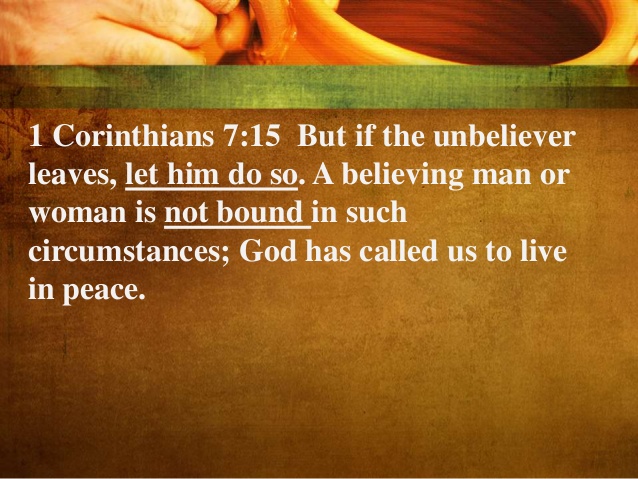Can a Divorced Remarry?
It depends on the “case” as the Bible reveals below (in the New Testament itself):
(1) First Case: Marriage between true believers
In this instance as the Blessed Lord also reveals to apostle Paul, such a person is to “remain unmarried” or be “reconciled to that spouse only” as long as “that spouse is alive” (see verse below):
“But to the married I give instructions, not I, but the Lord, that the wife should not leave her husband (but if she does leave, she must remain unmarried, or else be reconciled to her husband), and that the husband should not divorce his wife.” (1 Corinthians 7:10 – 11)
Why?
In principle, marriage between two “True believers” is “God’s Will” and thus a “separation” (due to sin) must not nullify His Will and thus it does “not” allow for a divorce but just “remain unmarried” or “be reconciled” as the criteria “What God has joined together, let no man separate” is fulfilled in this instance.
(2) Second Case: Marriage between an unbeliever and a true believer
The verses don’t end there. Now, if the verse quoted in case (1) above applies to ‘all marriages’ (believers or unbelievers alike), God would not have inspired apostle Paul to write the below:
Note that the phrase “but to the rest” indicates “all marriages which are not type (1) above” and the following begins to apply:
“But to the rest I say, not the Lord, that if any brother has a wife who is an unbeliever, and she consents to live with him, he must not divorce her.” (1 Corinthians 7:12)
Is that all?
No.
In principle, such marriages (in case 2) are “not in the Lord” and hence do “not” necessarily qualify to the condition for “no divorce” (only separation) as per case (1) simply because “God did NOT join a believer to an unbeliever” (He is NOT the author in such cases).
This means that these marriages (in case 2, between a believer and an unbeliever) are previously done in “error” (flesh, lust or otherwise instead of God’s Will as in case 1 only).
With this in mind, we may begin to understand “why” God allowed apostle Paul to write the verse below for “cases 2 only”:
“Yet if the unbelieving one leaves, let him leave; the brother or the sister is not under bondage in such cases, but God has called us to peace.” (1 Corinthians 7:15)
Here we see clearly that the “unbeliever leaving” such marriages (divorced or separated) is in a “permanent” way because “no” command “to be reconciled back to that spouse” or “remain unmarried” is instructed for case 2.
Read that verse 15 again and we find that the command given is “not under bondage (not bound, not in servitude)” —> toward that “divorced or separated believer” with respect to “case 2 marriages”.
Hence, being “not bound” (in servitude or bondage) can only mean either one of these two (choices, “being free” again in “Peace”):
(i) Remain unmarried
“I think then that this is good in view of the present distress, that it is good for a man to remain as he is.” (1 Corinthians 7:26)
(ii) Marry again, but “only in the Lord” (to a true believer implying case 1 marriage in this second attempt of remarriage):
“… Are you released from a wife? Do not seek a wife. But if you marry, you have not sinned; and if a virgin marries, she has not sinned… (emphasised part of 1 Corinthians 7:27 – 28)
It is evident that “released from a wife” (only possible for case 2 marriages where there is “no” bondage or servitude as God did “not” necessarily author such marriages in “His Will”) is what is referred to in the part of verse 27 above (no other possibilities).
Hence, the first part of verse 28 clearly refers to “verse 27’s those released from a wife (spouse)” are said to be “able” to “marry again” —> as this phrase implies so distinctly “But if you marry, you have not sinned;” (the “you” here is referring to verse 27’s released from a wife ones).
It just further adds that a “virgin marrying has not sinned either” further proving that verse 28 talks about two kinds of marriages which are allowed:
(a) “you” (the ‘released from a wife as per case 2) are allowed to “marry” (again)
And,
(b) the “virgin” (unmarried) are marrying (for the first time) is also “not” a sin.
End.
P/S:
Christ’s Blessed Words in the Gospel perfectly agrees to case 1 marriages as He quotes, “What God has joined together” (only marriages by “His Will”, case 1 only), let “no man separate”. And if anyone marries a separated or divorced person of case 1 type, it’s considered as “committing adultery”.
As the New Testament discusses only later (via apostle Paul’s writing) of “case 2” marriages, we see that the “accurate words” used allow remarriage even for the divorced or separated but only in such case 2 types.
Peace, shalom!




